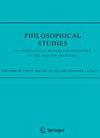The AI-design regress
IF 1.1
1区 哲学
0 PHILOSOPHY
引用次数: 0
Abstract
How should we design AI systems that make moral decisions that affect us? When there is disagreement about which moral decisions should be made and which methods would produce them, we should avoid arbitrary design choices. However, I show that this leads to a regress problem similar to the one metanormativists face involving higher orders of uncertainty. I argue that existing strategies for handling this parallel problem give verdicts about where to stop in the regress that are either too arbitrary or too difficult to implement. I propose a new strategy for AI designers that is better than these alternatives.
人工智能设计的倒退
我们应该如何设计人工智能系统来做出影响我们的道德决定?当我们对应该做出哪些道德决定以及用什么方法做出这些决定存在分歧时,我们应该避免武断的设计选择。然而,我的研究表明,这将导致一个倒退问题,类似于元规范主义者所面临的涉及更高阶不确定性的问题。我认为,现有的处理这一平行问题的策略所给出的关于在哪里停止回归的判断要么过于武断,要么太难实现。我为人工智能设计者提出了一种新的策略,它优于这些替代方案。
本文章由计算机程序翻译,如有差异,请以英文原文为准。
求助全文
约1分钟内获得全文
求助全文
来源期刊

PHILOSOPHICAL STUDIES
PHILOSOPHY-
CiteScore
2.60
自引率
7.70%
发文量
127
期刊介绍:
Philosophical Studies was founded in 1950 by Herbert Feigl and Wilfrid Sellars to provide a periodical dedicated to work in analytic philosophy. The journal remains devoted to the publication of papers in exclusively analytic philosophy. Papers applying formal techniques to philosophical problems are welcome. The principal aim is to publish articles that are models of clarity and precision in dealing with significant philosophical issues. It is intended that readers of the journal will be kept abreast of the central issues and problems of contemporary analytic philosophy.
Double-blind review procedure
The journal follows a double-blind reviewing procedure. Authors are therefore requested to place their name and affiliation on a separate page. Self-identifying citations and references in the article text should either be avoided or left blank when manuscripts are first submitted. Authors are responsible for reinserting self-identifying citations and references when manuscripts are prepared for final submission.
 求助内容:
求助内容: 应助结果提醒方式:
应助结果提醒方式:


